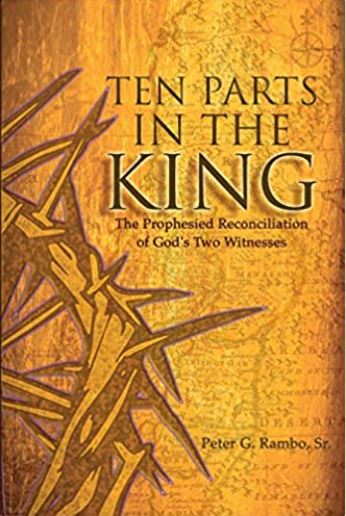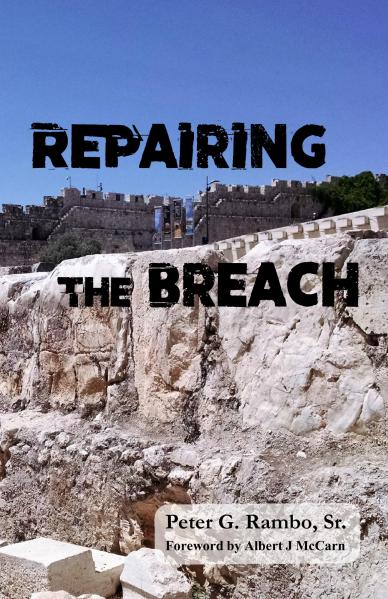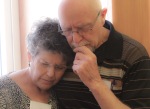I was raised in Christendom and later attended seminary and was ordained as a pastor in a Presbyterian denomination. One of the highlights of worship in Christendom is ‘The  Lord’s Supper’ or ‘Communion,’ served quarterly in some churches, more frequently in others.
Lord’s Supper’ or ‘Communion,’ served quarterly in some churches, more frequently in others.
A recent question concerning my faith was posed asking if our fellowship observed ‘the Lord’s Supper to remember Christ’s sufficient work to pay for our sins.’ While the question is multifaceted in that it has underlying questions about the sufficiency of Messiah and implied questions concerning the place of ‘working out our salvation with fear and trembling,’ I have been pondering the Christian tradition of the ‘Lord’s Supper.’ Is the normal praxis of Christendom with bread and wine defensible or even found in Scripture? Or, is it a tradition with little basis in Scripture and more a compilation of tradition and ‘feel good’ memories that may seem worshipful, but do not meet the expectations of a Holy God with clear instructions?
Tough, tough questions, but worth exploring!
Having led / performed 60-80 Communion services (our church practice while I was in the pulpit was quarterly observance) I’ll try to shed some light on this touchy subject.
One of the very central passages of Scripture that often begins the observance is,
23 For I received from the Lord that which I also delivered to you, that the Lord Jesus in the night in which He was betrayed took bread; 24 and when He had given thanks, He broke it and said, “This is My body, which is for you; do this in remembrance of Me.” 25 In the same way He took the cup also after supper, saying, “This cup is the new covenant in My blood; do this, as often as you drink it, in remembrance of Me.” 26 For as often as you eat this bread and drink the cup, you proclaim the Lord’s death until He comes.
A major, yet often overlooked, clue connecting Paul’s explanation with Biblical context is the little phrase ‘in the night in which He was betrayed…’
What was Jesus doing ‘in the night in which He was betrayed‘ that involved bread and wine?
Glad you thought to ask….
Matthew 26:18ff details what most already know,
18 And He said, “Go into the city to a certain man, and say to him, ‘The Teacher says, “My time is near; I am to keep the Passover at your house with My disciples.”’” 19 The disciples did as Jesus had directed them; and they prepared the Passover.
And, it was at that meal that the Messiah said,
26 While they were eating, Jesus took some bread, and after a blessing, He broke it and gave it to the disciples, and said, “Take, eat; this is My body.” 27 And when He had taken a cup and given thanks, He gave it to them, saying, “Drink from it, all of you; 28 for this is My blood of the covenant, which is poured out for many for forgiveness of sins. 29 But I say to you, I will not drink of this fruit of the vine from now on until that day when I drink it new with you in My Father’s kingdom.”
But of course!! They were celebrating Passover!
What many in Christendom are not aware of is that Scripture says at least four times that Passover is to be observed ‘forever/perpetually/throughout your generations,’ etc… (See Exodus 12:14, 24, 42; 13:10 and Lev. 23:14) Yeshua (Jesus), who by His own mouth said ‘not one jot or tittle will pass from the Law and the prophets until heaven and earth pass away,’ was simply being obedient to Scripture and deepening the meaning of this mandated annual feast. He was NOT adding to or changing the Torah, because to do so would be sin and would immediately disqualify Him as the spotless Lamb!
Deu. 12:28 “Be careful to listen to all these words which I command you, so that it may be well with you and your sons after you forever, for you will be doing what is good and right in the sight of the Lord your God….32 “Everything I command you, you shall be careful to do; you shall not add to nor take away from it.
Paul affirms this understanding of Passover in the I Corinthians 5:7-8 when he says,
7 Clean out the old leaven so that you may be a new lump, just as you are in fact unleavened. For Christ our Passover also has been sacrificed. 8 Therefore let us celebrate the feast, not with old leaven, nor with the leaven of malice and wickedness, but with the unleavened bread of sincerity and truth.
While Paul affirms the spiritual dimension of Passover as worship, he in no way undermines the physical keeping of God’s perfect instructions in righteousness. In fact, his example in Acts is of keeping Passover! (See Acts 20:6)
Conversely, there is no evidence, ZERO, ZILCH, NADA of any other form of observance involving bread and wine that displaces Passover. I do not have time to fully research the traditional practice of a crumb of bread and thimble full of wine, but if I were a betting man, even before looking any deeper, I would happily gamble everything I own against the understanding that Christian ‘Communion’ has no basis in Biblical practice. Rather, I can assure you that you’d find that the practice, while seeming to be rooted in Scripture, was actually developed years later as part of the divorce of Christendom from her Hebraic, even decidedly Jewish, roots.
This is a very tough thought to ponder. Seriously.
Scripture commands that we tear down, even destroy, idols and places of false worship. Christendom’s ‘Lord’s Supper’ is just that, a false worship, even idol that is divorced from Scripture.
Now what?
I know this has challenged some of my readers…. Don’t shoot the messenger. Get out your Bibles and ask God to remove any blinders or traditions and just show you Truth. He will show you Truth and likely will even be gentle, though the initial stripping away is not easy… It may be painful.




















































































































But if he was doing Passover how then could he become the perfect lamb sacrifice days after the lamb for Passover was already sacrificed?
LikeLike
Good question. The first Passover was on the night of the 14th, though later, as I understand it, the memorial observance came to be celebrated on the 15th. If that were so, then He ate on the anniversary of the original, while dying the next afternoon (not days) at the time of the Passover lambs for the 15th observance. It is a debated topic, but I tend to side with Scripture that clearly articulate both that they ate the Passover and He was slain on Passover…
LikeLike
Regarding Passover meal or not; I’ve been round and round with so many details, searching the truth on this matter. One detail to consider is the word bread (artos) in verse 26 and unleavened bread (azymos) in verse 17.
LikeLike
good morning pete,
jesus was not observing the sacrificial passover “meal” required in levitius 23 to be observed on the 15th of nisan.
we need to understand the use of the word “passover” in scriptures.
“passover” is a word used to refer to the lamb, to the meal, to the day, to the entire 8-day commanded observance in lev 23 (passover-one day and feast of unleavened bread-7 days). jesus’ use of the word “passover” was referring to the day, the first day commanded in lev 23 to be observed. jesus used the evening meal of that day to say goodbye to his disciples.
the evening meal jesus had with his disciples was eaten on the night of the 14th of nisan. but it was a special one, different from all other evening meals eaten on the 14th of nisan. it was to be a memorial of him as the sacrificial passover lamb. whereas the passover “meal” commanded eaten on the 15th of nisan is a memorial of that night the israelites with the lamb’s blood on their lintels were “passed over” by the angel of death. this was prophetic of what jesus will have to do to reconcile us to god.
the meal jesus had with his disciples was eaten with leavened bread (gk. artos). he was our bread (artos) of life. whereas the passover meal was eaten with unleavend bread (azumos).
the meal jesus had with his disciples was to be observed “as often” (any number of times). whereas passover was commanded to be observed once a year, on the 15th of nisan.
the passover (lamb, meal and day) was both the symbol and prophecy of the sacrifice of our lord and savior to take away the sin of the world. this commanded observance is the first of the commanded observances of lev 23 that outlines how god will bring about how we can be reconciled to him and enter his eternal kingdom (last great day).
therefore, both meals need to be observed by all believers: the lord’s supper as often, and the passover meal on the 15th of nisan. this is what both jews and gentiles miss to understand for hundreds of years.
scriptures forbid “interpretation” but encourages us to seek from the eternal one the light of understanding to us who are mere mortals. the book of psalms recount how often david, who meditated on the word of god, begged for understanding. my coming to understand the use of the word “passover” come from my following the command not to interpret but to seek from our heavenly father understanding of his word. for this i bless our father in heaven with all my mind, heart and soul.
however, he also uses believers he has revealed more to shed more light to an understanding. i encourage everyone who has deeper or more accurate understanding on this issue to share this with me as priscilla and aquila shared their more complete understanding with apollos.
there remains so many i still do not understand, but i am confident the eternal one will give them to me as i need them. and i suppose the rest will be explained in his kingdom in the new earth under the new heaven.
LikeLike
My rabbi has some interesting insights, some of which I shared in this post. http://www.journeytomessiah.com/passover-seder/a-real-seder-or-just-a-teaching-opportunity/
LikeLike
Remember that the command was to KEEP the Passover…..not to BECOME it. So He may have been keeping what He believed to be the Passover (different calendars) in keeping with the Torah.
LikeLike
You just hit the nail on the head about them eating leavened bread during the evening meal. There is NO way that they would have been eating leavened bread during the Passover meal. The Spring Feast is perfectly “played” out to fulfill prophecy and righteousness. Yeshua is “sacrificed” at the exact time of the perfect lamb being sacrificed. He is put into the earth at the same time as the lambs are put into the ovens to be eaten later for the Passover meal with unleavened bread (just after twilight, which is the Feast of Unleavened bread/Passover) Preparing for Passover is something that starts several days before the event. They were all on the same calendar. The rulers didn’t want to be unclean in order to be able to celebrate Passover that evening at twilight, some 16 hours later. Modern Christianity has divorced it’s Hebrew roots and intentionally change Passover/ FOUB to something entirely gentile. That is not to say that we shouldn’t celebrate the breaking of bread/wine as a memorial to the covenant we have with our Master and King. Just a thought.
LikeLiked by 3 people
For whatever my little thought process is worth….I see it exactly as you do Pete. I believe that “Do this” was referring to Passover. As for the timing…..I have an opinion as to what MIGHT be true………..Father commanded us to keep the Passover and as best I can tell….that meant that the lamb was chosen on the 10th and killed on the 14th, and roasted so as to consume it at the end of the day of the 14th as the sun was setting, and that the original Passover (Angel of Death passing over)…..occurred around midnight that night which had become the 1st day of Unleavened Bread. I believe that Yeshua was keeping THAT commanded Passover. He had to keepthe commandments in order to be that spotless sacrifice. The gospel account indicates that He thought it was the Passover and His disciples did and probably some others as well, and yet…….the priests and rabbis and “the Jews” seemed to be keeping the next day. Yikes. Don’t shoot me….I’m just making a suggestion here, but what if………………Yeshua considered Passover a day earlier than the rabbis and priests because He was keeping the days of the month by conjunction while the traditional Jews of the day………were keeping according to the sliver? I have read some history that there was even at that time, a disagreement as to how to determine the New Moon. Whatcha think?
LikeLike
Very interesting! 🙂
LikeLike
That’s interesting thoughts. The next part of that would be the three days and three night in the tomb and two sabbath days. How all that would work out with the thought of the day of the month plays out. Where did the second sabbath come in if it did?
LikeLike
One actual weekly Sabbath and the other the Sabbath of Unleavened Bread………..?
LikeLike
Passover itself is a high Sabbath, so that would mean He died Wednesday at sunset, Thursday was the Passover high Sabbath, Friday they bought spices, Saturday Sabbath, then He was raised at sunset Saturday evening and the grave found empty the next morning.
LikeLike
Plausible, though i try not to get wrapped up in the moon issue…
LikeLike
Excellent!!
LikeLike
Could He have been teaching His students/disciples on the beginning of the 14th (or what we would term as the evening of Tuesday/the end of the 13th/beginning of the 14th)? Then, He would have kept the Passover by being IT that year. I heard that teachers/rabbis would do that… teach their students and then everyone would celebrate the real thing with their families.The others would have actually kept it with their families the following day and into the evening (the end of the 14th/beginning of the 15th). Just a thought.
LikeLike
Passover is a moment on the 14th, when the angel passed over the children of Israel. From what I understand, Passover is the actual sacrifice, not a day. The feast celebrated is Unleavened Bread. The first day of Unleavened Bread starts the 15th. Celebrate the Passover (the Lamb, the sacrifice) on the 14th.
LikeLiked by 1 person
I heard that rabbis would have a Passover rehearsal the night before the real thing, so Yeshua, being a rabbi did this. He would teach his students and then they would be with their families for the real celebration to come the following day.
So, He was taken after the rehearsal at the beginning of the 14th (Tuesday night), tried and killed on the day of the 14th (Wednesday), and taken down right before the 15th, the first day of Unleavened Bread which is a sabbath (rest day) (I think Wednesday night that year). He was in the grave three nights and three days. Wed evening to Thurs evening (1 day and 1 night). Thurs evening to Fri evening (1 day and 1 night). Fri evening to Sat evening (1 day and 1 night). He rose on First Fruits! It’s the day after the Sabbath (weekly Shabbat) which very well could have been Saturday night and not our traditional Sunday morning.
LikeLiked by 2 people
Skip Moen (author of “Crosswords”) suggests that Messiah accomplished His work as the sacrifice for our sins in the Heavenly Temple long BEFORE He celebrated the Passover on the night before His death. As Mr. Moen reminds us: “And all that dwell upon the earth shall worship him, whose names are not written in the book of life of the Lamb SLAIN FROM THE FOUNDATION OF THE WORLD.” (Rev13:8) He suggests that Messiah’s death on the cross and His subsequent resurrection was for the purpose of establishing His claim to be able to provide eternal life to the obedient. I am still studying this concept through, but it would definitely eliminate any concern that Y’shua was not sacrificed on the ‘right’ day. It would also alleviate the concerns that His Blood was not poured on the earthly altar, as required by Torah.
LikeLike
It also proves the Torah existed before Creation, because the penalty which He paid had to be identified before He paid it, therefore the standard had to preexist the payment.
LikeLiked by 1 person
Exactly.
LikeLike
Didn’t Yeshua have to die AND be laid in the grave before sunset because of the sabbath of the first day of Unleavened Bread? Scripture separates 14th and 15th. Passover is on the 14th (sometime before sunset) and the first day of Unleavened Bread is the 15th.
LikeLike
Didn’t Yeshua have to die AND be laid in the grave before sunset because of the sabbath of the first day of Unleavened Bread? Scripture separates 14th and 15th. Passover is on the 14th (sometime before sunset) and the first day of Unleavened Bread is the 15th.
Also, YHVH didn’t call Passover a high sabbath, but the first and last days of Unleavened Bread are sabbaths. Yeshua would have died on the tree, been taken down, cleaned up, wrapped, and spices would have been put on him, laid in the grave all before sunset.
LikeLike
A thought… or two…
Does Scripture state He died at the 9th hour? Wouldn’t that be the 9th hour of the day on the 14th? 3pm? If so, they would have had plenty of time to take Him down and prepare His body to be put in the grave by the sabbath of the first day of Unleavened Bread. The women bought their spices on the day after the sabbath which was also the day before the weekly Shabbat so they could have them on the first day of the week when they planned to go to His tomb.
LikeLiked by 1 person
Bingo!! Exactly what happened.
LikeLike
One has to wonder how Yeshua could be keeping Passover if He was killed the day just prior to the evening the meal was to be eaten? If the meal was a Passover meal, why is “artos” (a raised loaf) mentioned as the bread served? If this was a Passover meal, why would it be assumed when Judas left he was leaving to purchase something? Wouldn’t every shop be closed with every Hebrew family there eating the meal themselves?
Is it possible we have an even more compelling clue as to what is going on in the words that Yeshua said:
Matt 27:27 And taking the cup, and giving thanks, He gave to them, saying, Drink all of it.
28 For this represents My blood of the New Covenant which concerning many is being poured out for remission of sins.
29 But I say to you, I will not at all drink of this fruit of the vine after this until that day when I drink it new with you in the kingdom of YAHWEH.
Considering while on the cross He refused vinegar twice, maybe what’s going on here is a vow (see Numbers 6th chapter) to complete the work (restoration of the kingdom) He was beginning no matter what it may look like. Could it be that as often as we do this (break bread together) we bring remembrance of His promise? Could it be that during Passover we understand that the wrath due us, for going into idolatry, has been turned away by the blood of the bridegroom who died so we’re no longer under the curse? The old leaven being an obligation to observe contrasted by the new being from a heart of gratitude?
Food for thought anyhow 😁😁.
LikeLike
Exod24:6 And Moses took half of the blood, and put it in basons; and half of the blood he sprinkled on the altar. 7And he took the book of the covenant, and read in the audience of the people: and they said, All that the LORD hath said will we do, and be obedient. 8And Moses took the blood, and sprinkled it on the people, and said, BEHOLD THE BLOOD OF THE COVENANT, which the LORD hath made with you concerning all these words.
Do you think that it has anything to do with the blood of the covenant offered by Moses. The blood of the first covenant went on the outside, the blood of the New Covenant went on the inside.
LikeLike
Pete, all I have to say is ‘amen’ to your article!
LikeLike
Reblogged this on Jewish and Christian News.
LikeLike
Thanks, Pete–I’ve been wrestling with this issue too. Here’s where I get tripped up: The context seems to indicate they are coming together regularly–“v. 18, when you come together as a church” and “v. 20, meet together” sound like regular gatherings to me and not just an annual Passover meal:
“18 For, in the first place, when you come together [p]as a church, I hear that [q]divisions exist among you; and in part I believe it. 19 For there must also be factions among you, so that those who are approved may become [r]evident among you.20 Therefore when you meet together, it is not to eat the Lord’s Supper, 21 for in your eating each one takes his own supper first; and one is hungry and another is drunk. 22 What! Do you not have houses in which to eat and drink? Or do you despise the church of God and shame those who have nothing? What shall I say to you? Shall I praise you? In this I will not praise you.”
Can you shed any light on this? Thanks!
LikeLike
Fellowship meals w Shabbat are very common and, like the Scripture seems to indicate, have been going on for several thousand years. Typically, as you well know, bread and wine are blessed and in Messianic homes, the Body and blood of Messiah is remembered. But, what does Scripture command and what do both Yeshua and Paul associate the celebration with? Pesach.
Nothing wrong with remembering at every gathering as Yeshua is our eternal hope, but when we add to Scripture by assuming some tradition that takes the place of Pesach, then we are way off the narrow way.
Looking forward to seeing you next weekend and would like to invite you to join us for Erev Shabbat meal.
שבת שלום!
LikeLike
Well, thank you very much–I would love it! Looking forward to seeing everyone!
LikeLike
K. Count on it.
LikeLike
Here’s an interesting article I found and just read:
http://www.herealittletherealittle.net/index.cfm?page_name=Last-Supper-Passover-Meal
LikeLike
Personally, I always enjoy the time of communion. It was the first connection God used to point to our Judaic roots.
When I was in Israel, the Messianic congregation I attended had a time of ‘communion’ after the service – the bread and the wine, remembering what our Messiah did. As with our Sabbath meals, it was a special time of coming together as a family to celebrate the Sabbath and Messiah our Passover.
LikeLike
What we do apart from Passover is to do ‘communion’ each new moon. Each new moon is a renewing, a restoring of things, we do this as not just a time to remember what Yeshua did but to understand what He will do when He returns also. When He comes again we will be renewed, made new in bodies where we sup with Him in the marriage supper, its just another way of looking forward as well as backward.
LikeLiked by 1 person